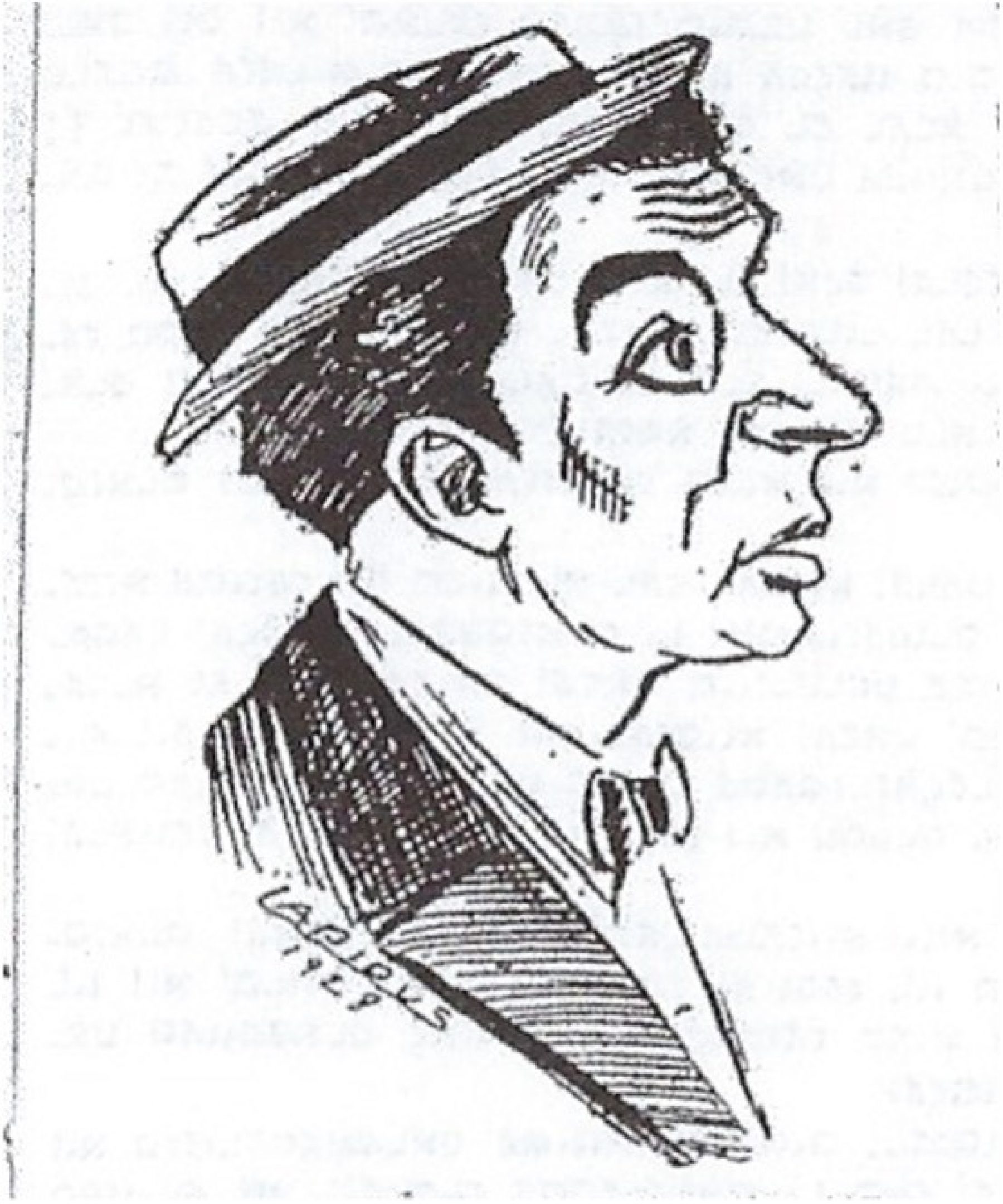
Menashe Skulnik in The Big Earner (Der groyser fardiner), by Harry Kalmanowitz and William Siegel. Cartoonist: S. Lapidus. Source: Penem’er un penem’lakh (Caras y caritas), Buenos Aires, no. 257, 1929. (This portrait was first published in issue no. 198 [1928] of Penem’er un penem’lakh.)
Menashe Skulnik Becomes a Star in Buenos Aires
Zachary Baker
Menashe Skulnik (1892-1970) was one of the great comic actors of the Yiddish theatre, remembered for his trademark porkpie hat and beloved for his schlemiel-like stage persona. His theatrical career spanned nearly seven decades, but he did not emerge as a major Yiddish star on New York’s Second Avenue until the 1930s, a dozen or more years after his fellow comic actors Ludwig Satz and Aaron Lebedeff first made their marks.
In 1963, over a period of nine months, the Yiddish Forverts (Forward) newspaper published his serialized memoir, Menashe Skulnik dertseylt (The Menashe Skulnik Story). In it, Skulnik chronicled the trajectory of his long career, from his early days in Warsaw to his English-language performances on Broadway, radio, and even television. A very large portion of the memoir is devoted to Skulnik’s years in the wilderness, when he earned his livelihood as a theatrical jack-of-all-trades: stage manager, scenery designer, makeup artist, script doctor, and performer of bit roles. Skulnik spent much of the 1920s honing his craft in such outposts as Philadelphia, Chicago, Detroit, Toronto, and Montreal. He also became an audience favorite in Buenos Aires, and made repeated visits there starting in 1928.
In early May of that year, Skulnik was approached by the actor Joseph Schoengold (1887-1943), who had a contract to perform at the Teatro Excelsior in Buenos Aires during the coming months. Schoengold had performed in Argentina the previous year, to considerable acclaim. Although he never became a major star in New York, Schoengold enjoyed a distinguished career on the Yiddish stage. Both of his parents were Yiddish actors, as was his wife, Frances Adler, who, moreover, was the daughter of the famous Yiddish stars Jacob P. Adler and Sara Adler. (During her husband’s 1928 performances in Argentina she was on tour in Brazil.)
Originally, Schoengold had invited Lucy Finkel (Paul Muni’s sister-in-law) to accompany him to Argentina as prima donna, but that arrangement fell through. So as a fallback, Schoengold asked Skulnik to travel with him to South America. (The two actors had performed together previously, during tours in the US and Canada.) Skulnik accepted the invitation with some trepidation, as he was still fairly unknown, and they agreed to split the proceeds 65/35, with Schoengold taking the larger share.
The plan was for Schoengold to put on a mix of serious dramas, melodramas, and operettas with him as leading actor and Skulnik appearing in secondary roles for comic relief. In addition, Skulnik was to put on a comedy titled (appropriately so, as it turned out) The Big Earner (Der groyser fardiner). Meanwhile, Schoengold quickly saw that he was not drawing the audiences for his own repertory, so he asked Skulnik to add scenes for himself in those plays. Not only that, but in order to make room for Skulnik, Schoengold cut many of his own lines and insisted that they share their earnings equally. Outside of the theater, wherever he went, Schoengold brought along Skulnik as a kind of mascot—affectionately addressing him as “my ferdele” (my little horsey). To a journeyman actor like Skulnik, Schoengold’s generosity was unheard-of. Skulnik’s star vehicle, The Big Earner, ended up running to packed houses for an unprecedented three weeks.
The tour was a tremendous success; as Skulnik put it, “The audience there was actually the first one to discover me. Buenos Aires was the first city in the world that placed the stamp of ‘star’ on me.” It would take several more years for him to achieve a similar status on Second Avenue. In this excerpt, written thirty-five years after he first visited Buenos Aires, Skulnik describes one scene where his mastery of comedic pantomime brought down the house.
* * *
Menashe Skulnik, “I Become a Star in Buenos Aires” (excerpt), Forverts (Forward, New York), April 17, 1963.
Translated by Zachary M. Baker
I really, really liked Buenos Aires, and it’s no mystery as to why. The theatre and the audience spoiled me. The press fawned over me. I was in heaven. To tell the truth, I had absolutely no desire to leave because I never had such good roles in North America. [….]
Buenos Aires back then reminded me of our own East Side during the first years of our immigration. New immigrants were arriving there every single day. It was positively swarming with greenhorns—“gringos” as they were called. In those days there was as yet no industry, unlike here in North America, so Jews sold lottery tickets on the city streets: Jews, large and small, chasing about, running, buying, just making a living—everyone was engaging in the trade in lottery tickets. [….]
Now, I found it quite funny that in every hotel there, in the finest restaurants, and in private residences there were no “toilet tissues” in their bathrooms, the way it is with us in North America. There were only pieces of newspaper that had been cut into squares with a scissors and hung up on an iron hook. They were cut very elegantly with a scissors or a knife from the old newspapers, straight as can be. I saw this everywhere—in rich homes, in fancy restaurants, in office buildings: perfectly rectangular pieces that had been cut out of old newspapers…I imagined that in each and every house, wherever you went, there must be someone who was assigned this task…wielding a knife or scissors to cut out these square pieces from a stack of old newspapers and then hang them on a nail…moreover, it must have demanded a lot of time to prepare and carry out this task, at least once a week.
One fine evening Joseph Schoengold happened to come into my dressing room, and he asked me not to leave the stage during the third act, the way we’d done it in the daytime rehearsals. Instead, he wanted me to remain seated on stage. “But there’s nothing left for me to do in this play,” I said. He pleaded with me: “You’ll find something to do soon enough. Maybe when you’re on stage something’ll come to mind — you’ll break in with a word or a gesture because the plot is dull. I’ll be satisfied if you manage to raise a chuckle from time to time…”
“Well, fine,” I said. “I’ll give it a try.”
I was playing an old grandfather, so in the third act I asked the stage manager to put me at a table with a stack of newspapers and a knife and scissors. And then I sat down in a corner of the stage, far from where the play’s action was going on. I placed a pair of spectacles at the tip of my nose, donned a yarmulke on my head, sat calmly, and immersed myself with great seriousness, cutting squares from those newspapers and placing them one on top of the other. I did this earnestly and piously, as if I were engaging in a sacred deed. I paid no attention to what the other actors were saying—the action on stage was of no concern to me. I was preoccupied with my holy task: cutting paper squares from old newspapers.
And it didn’t take long for the audience to begin to notice what I was up to. At first, they began to smile and then… laughter, loud laughter, louder and even louder, until it turned into uproarious laughter. It went on without end and the actors had to stop speaking. They all turned around and looked to see what I was doing; meanwhile, the raucous laughter in the theater continued without pause. But I soldiered on; I was cutting my little paper squares with such devotion as though I were standing for the Shemoneh-esreh prayer, if you’ll excuse the comparison.
The play was the biggest success of the season. People weren’t interested in the play or the plot; they ran to see the amazing sight of Menashe Skulnik cutting up asher-yotser paper. *
So, you want to go to college… why bother?
* In Yiddish, asher-yotser-papir means “toilet paper.” The expression derives from the Hebrew blessing (Birkas asher yotser / Birkat asher yatsar) that is recited by Orthodox Jews after excretion or urinating.
